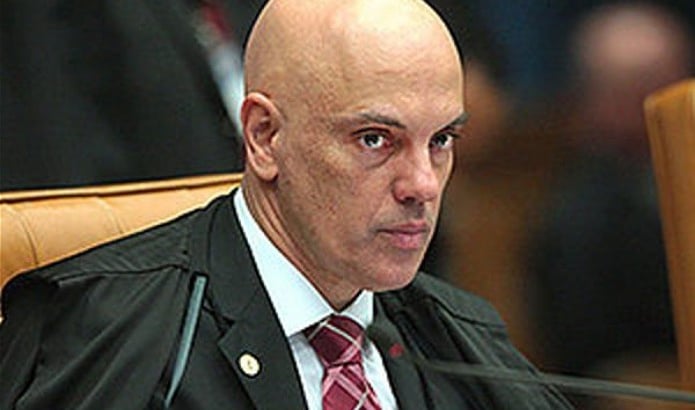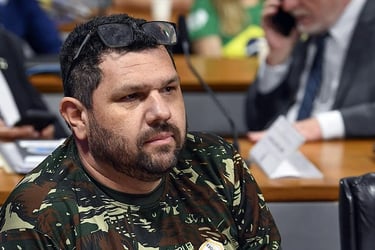Intervention in Brazilian Diplomacy: If This Isn't Authoritarianism, What Is?
Intervention in Brazilian Diplomacy: If This Isn't Authoritarianism, What Is? An alarming diplomatic standoff is unfolding between Brazil and Spain, with Supreme Federal Court (STF) Minister Alexandre de Moraes at the epicenter of the brewing storm.
Everton Faustino
4/20/20254 min leer


The Genesis
The genesis of this conflict traces back to Brazil's extradition request for blogger Allan dos Santos, currently residing in the United States. In response, both the United States and Spain denied Brazil's request to extradite Allan dos Santos. More recently, Spain further rebuffed Brazilian judicial authorities by refusing the extradition of Italian-Brazilian journalist and blogger Oswaldo Eustáquio, citing apprehensions about freedom of expression and the perceived impartiality of Brazil's judicial system.
Retaliation
The retaliation from Brazilian Supreme Court Minister Alexandre de Moraes was swift and decisive. In a move that has ignited strong reactions internationally, the minister suspended the extradition of Bulgarian national Vasil Georgiev Vasilev, accused of trafficking and financial crimes, to Spain. This decision, widely interpreted as a pressure tactic, has been viewed by many as an affront to Spanish sovereignty and a blatant disregard for Brazilian law and the established diplomatic protocols of the Itamaraty (Brazil's Ministry of Foreign Affairs).
Heightening the already strained relations, Moraes further ordered the unprecedented summons of the Spanish diplomat responsible for judicial affairs at the Spanish Embassy in Brazil. This action, with no recent parallels in bilateral relations, has been broadly condemned as a measure of intimidation and a clear violation of diplomatic protocols. The summoning of a foreign representative to provide explanations in a Brazilian judicial process, particularly amidst a diplomatic row, carries the significant risk of triggering a severe diplomatic incident. Such an act can be construed as an infringement upon Spanish sovereignty and a disrespect for the international conventions governing relations between nations, potentially leading to retaliatory measures and a further deterioration of Brazil-Spain ties.
Spain, in turn, has intensified the pressure, formally requesting that Interpol remove Eustáquio's name from its list of wanted individuals. While the likelihood of Interpol acceding to Spain's request remains uncertain, the very request signifies a notable setback for Brazil's judicial standing.
Concerns raised about Moraes' decision
Critics argue that Moraes' actions have overstepped the boundaries of his judicial mandate, encroaching upon the diplomatic sphere and jeopardizing bilateral relations. The Itamaraty, the institution traditionally tasked with conducting Brazil's foreign policy, has been placed in a precarious position, forced to navigate the fallout from the minister's controversial decision.
The reaction to Alexandre de Moraes' decision, particularly concerning the suspension of the extradition and the summons of the Spanish diplomat, has sparked a heated debate within the Brazilian Supreme Federal Court itself and the broader Brazilian legal community. While direct public statements from STF ministers on specific cases are generally infrequent, discernible trends and concerns have emerged:
Concern Regarding Reciprocity:
There is a growing emphasis on the principle of reciprocity in extradition matters. Ministers have stressed that international cooperation in criminal matters hinges on mutual reciprocity between nations. Moraes' decision, in invoking this principle, reflects this underlying concern.
Statements released by the STF indicate the court, through Moraes, is indeed focused on the principle of reciprocity.
Respect for Diplomatic Protocols:
The summons of the Spanish diplomat has raised significant questions regarding respect for established diplomatic protocols and the separation of powers. There is a palpable concern that judicial actions might be encroaching upon the diplomatic sphere, which is traditionally the purview of the Itamaraty.
A growing worry exists that such actions could trigger retaliatory measures and precipitate diplomatic crises.
Judicial Independence and Sovereignty:
A debate is intensifying regarding the limits of judicial independence and the imperative of respecting the sovereignty of other nations. Spain's decision to deny Eustáquio's extradition, citing concerns about the impartiality of the Brazilian judicial system, has ignited discussions about the international perception of Brazil's judiciary.
There is increasing apprehension about the international image and standing of the Brazilian judiciary.
It is crucial to note that the STF, as a collegiate body, strives to maintain a delicate balance between defending national sovereignty and adhering to international norms. However, the individual decisions of its ministers can, as demonstrated in this instance, generate significant tensions and debates.
A further point of contention revolves around Alexandre de Moraes' invocation of the law of reciprocity as justification for suspending the extradition to Spain. Legally, reciprocity is a principle that can underpin decisions in extradition cases, particularly when bilateral treaties exist or when domestic legislation provides for it. However, the application of this principle in this specific context raises serious questions about whether Moraes' retaliation respected legal and diplomatic boundaries.
While Brazil's Migration Law and the Extradition Treaty between Brazil and Spain do mention the requirement of reciprocity, the manner in which Moraes has applied it may have exceeded legal limits and disregarded diplomatic norms. Suspending the extradition of an individual accused of a crime as a means of retaliating against another country's decision in a separate case can be perceived as a politicization of justice and an instrumentalization of legal processes for the purpose of diplomatic pressure. Furthermore, the summons of the Spanish diplomat adds a layer of complexity and potential disrespect for international protocols, suggesting that Moraes' action, even while invoking reciprocity, may have crossed the line between defending national interests and engaging in diplomatic aggression.
Oswaldo Eustáquio: One more controversy.
Adding another layer of complexity to the unfolding drama, Portuguese journalist Sérgio Tavares reported the leak of a video purportedly showing a conversation between Eustáquio and a former aide to Alexandre de Moraes. According to Tavares, the footage allegedly reveals irregularities and potential collusion. While the authenticity of the video and its impact on ongoing investigations are still under scrutiny, its release has injected a volatile element into the already tense situation. Eustáquio, consistently demonstrating a detachment from honesty and a keenness for opportunism, has frequently sought the limelight, and this episode may simply be the latest chapter in his contentious trajectory.
Concerns
The escalating impasse between Moraes and the Spanish judiciary exposes a concerning crisis of confidence in Brazilian institutions and raises critical questions about the role of the judiciary in foreign policy. Moraes' decision to encroach upon the diplomatic arena has ignited a debate about the limits of judicial power and the fundamental necessity of respecting international protocols. The international community is observing these developments with apprehension, deeply concerned about the potential ramifications for bilateral relations and Brazil's standing on the global stage.
Minister Alexandre de Moraes: This escalating dispute is laying bare tensions between the Brazilian and Spanish judiciaries, raising profound concerns regarding judicial independence and the sanctity of international diplomacy.


